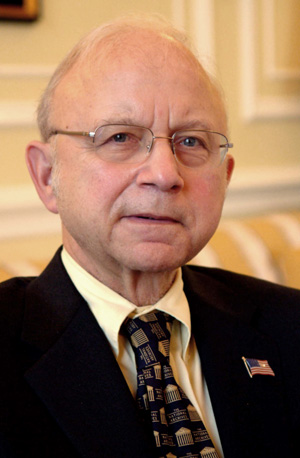
Allen Weinstein, Ninth Archivist of the United States (2005-2008)
In early 2005, President George W. Bush re-nominated Allen Weinstein to be the ninth Archivist of the United States and the U.S. Senate confirmed the nomination (President Bush had previously nominated Weinstein in 2004 but the Senate failed to confirm the appointment).
During his tenure, Professor Weinstein promoted increased access to NARA holdings, put greater emphasis on civic education, oversaw progress in preserving electronic records, and expanded the National Archives’ role in the international archival community. Accomplishments included:
- A one-third increase in the level of congressional funding.
- The launch of the Electronic Records Archives (ERA), to store and make accessible electronic records of government, as well as partnerships with private companies to digitize for the ERA traditional records in NARA’s holdings.
- An overhaul of the method by which the government classifies and declassifies documents so that sensitive documents need be withheld only for as long as necessary.
- Inclusion of the once-private Nixon Library into NARA’s system of Presidential libraries, the release of additional tape recorded conversations of Presidents Lyndon Johnson and Richard Nixon, and preparations for the George W. Bush Presidential Library in Dallas.
- An expansion of public outreach programs, in partnership with the National Archives Foundation, through the creation of the Digital Vaults and the Boeing Learning Center, and through efforts to raise the level of civic literacy among the public through education and museum programs.
- The launch of a major initiative to eliminate the enormous backlog of unprocessed records. In 2006, the backlog consisted of 1 million cubic feet of records. In two years, the backlog was reduced by 20 percent.
- Implementation of plans to provide new facilities for the National Personnel Records Center in St. Louis, which at that time housed 4 million cubic feet of retired military and civilian personnel records.
- Creation, in the aftermath of Hurricane Katrina, of the “First Preservers” program, which offered support and guidance to state archives and local records repositories to preserve vital records.
- Continued growth of the Federal Records Center program. At the end of his tenure, the FRCs stored 27 million cubic feet of federal agency records, an increase of more than 7 percent from 2005 to 2008.
- A developing leadership in the international arena. NARA hosted delegations of foreign archivists and other foreign dignitaries and cooperated in international programs and agreements with foreign archives, especially Library and Archives Canada.
Before coming to the National Archives Allen Weinstein was a college professor, historian, author, and international envoy. From 1985 to 2003, he served as president of The Center for Democracy, a nonprofit foundation he created in 1985 to promote and strengthen the democratic process, based in Washington, DC. His international public service activities include chairing the Center’s election observation delegations in El Salvador (1991), Nicaragua (1989-90, 1996), Panama (1988-89), the Philippines (1985-86), and Russia (1991, 1996, 2000).
Professor Weinstein’s international awards included the United Nations Peace Medal (1986) and The Council of Europe’s Silver Medal (twice, in 1990 and 1996), presented by its Parliamentary Assembly. His other awards and fellowships included two Senior Fulbright Lectureships, an American Council of Learned Societies Fellowship, the Commonwealth Fund Lectureship at the University of London, and a Woodrow Wilson International Center for Scholars Fellowship.
He was University Professor and professor of history at Boston University from 1985 to 1989, University Professor at Georgetown University from 1981 to 1984, and from 1981 to 1983, executive editor of The Washington Quarterly at Georgetown’s Center for Strategic and International Studies. He served as a member of The Washington Post editorial staff in 1981. From 1966 to 1981 he was professor of history at Smith College and chairman of its American studies program. In 1984 he served as president of the Center for the Study of Democratic Institutions. From 1982 to 1984 he directed the research study that led to creation of the National Endowment for Democracy and was acting president of the endowment. He also held visiting professorships at Brown, Columbia, and George Washington universities.
Weinstein’s books include The Story of America; The Haunted Wood: Soviet Espionage in America—The Stalin Era; Perjury: The Hiss-Chambers Case, which received several citations including an American Book Award nomination; Freedom and Crisis: An American History; Between the Wars: American Foreign Policy from Versailles to Pearl Harbor; Prelude to Populism; and among edited collections, Conflict in America; American Negro Slavery; American Themes: Essays in Historiography; and Truman and the American Commitment to Israel.
Weinstein’s articles and essays have appeared in numerous popular and scholarly publications as well as mainstream newspapers and magazines. His television credits include that of historical consultant on two History Channel programs on Soviet espionage (1998-99) and the 1988-89 PBS series Face-to-Face: Conversations on the U.S.-Soviet Summitry (co-host, editor and writer). He was a frequent commentator on CNN, C-SPAN, and other networks.
Professor Weinstein resigned as Archivist of the United States on December 19, 2008, citing health issues. He passed away on June 18, 2015, in Gaithersburg, MD. The cause was pneumonia. He was 77 years old.
